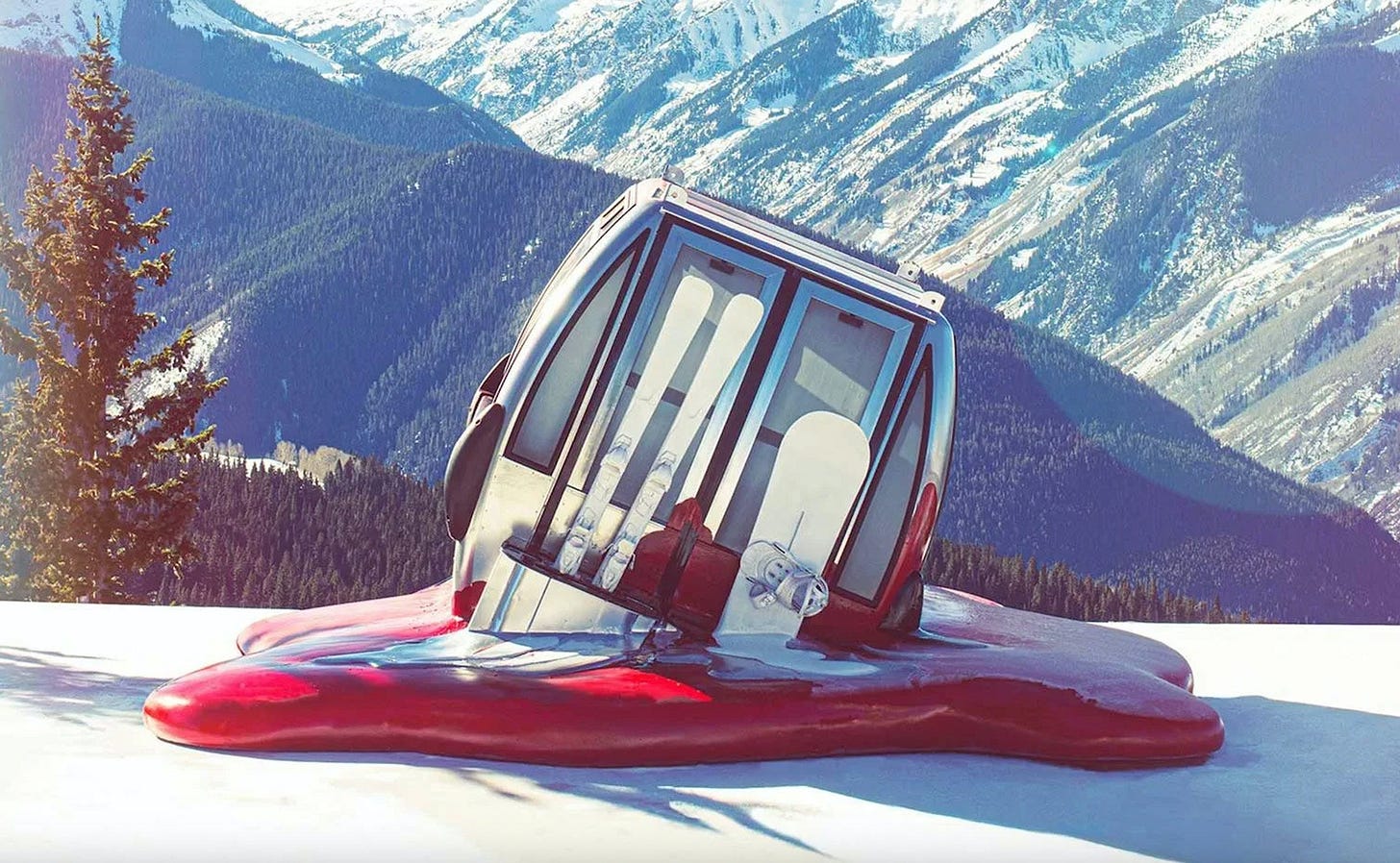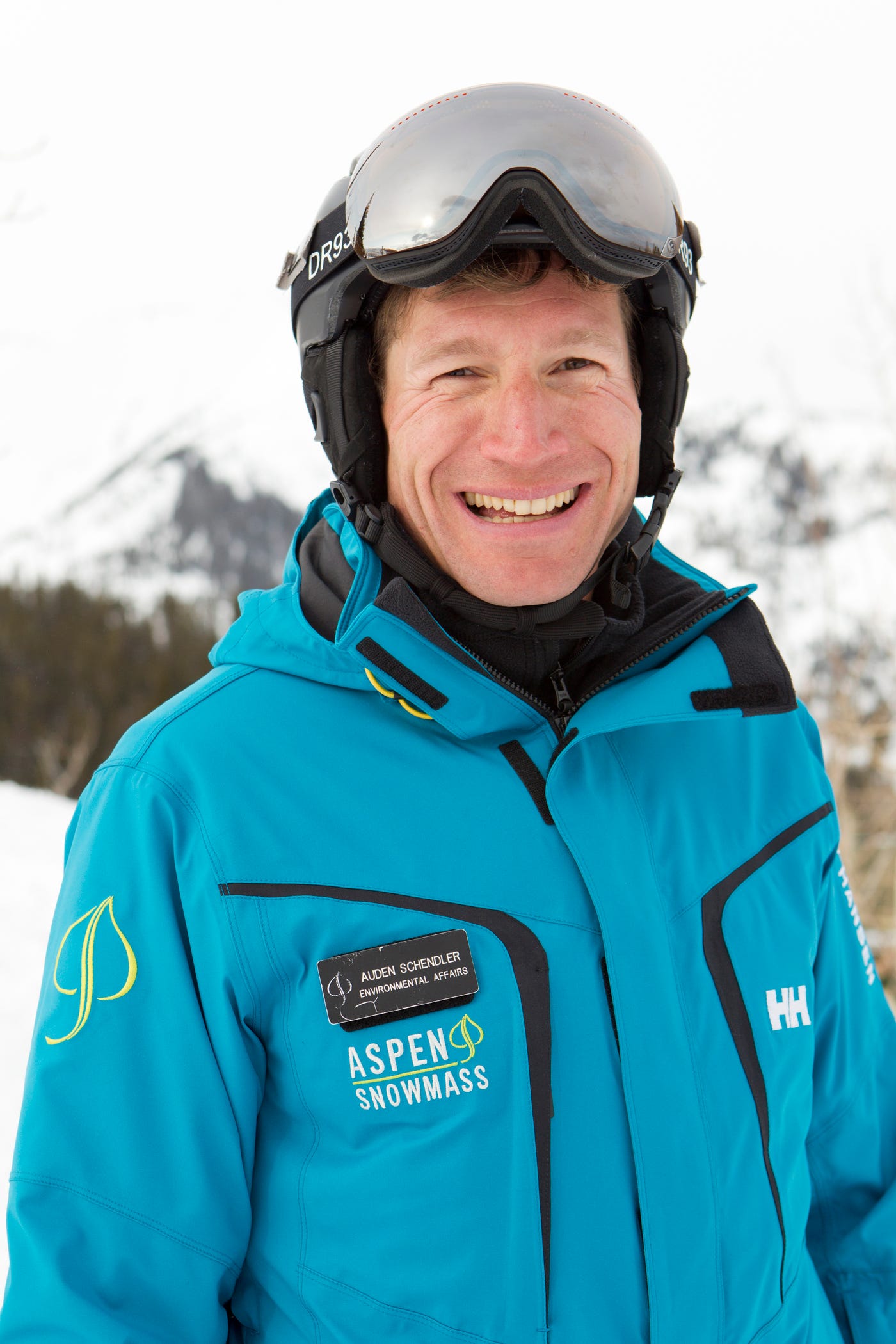“We didn’t demand our ski lifts run using energy that will destroy civilisation.”
An interview with Auden Schendler, climate activist and SVP of Sustainability at Aspen Skiing Company
“We didn’t demand our ski lifts run using energy that will destroy civilisation, we just want to run the ski lifts.”
From Just Stop Oil Norway to Montagne Verte in Morzine, I’ve spoken to some super-important grassroots voices who are responding to the climate crisis. But this week, at the other end of the spectrum, I have an interview with Auden Schendler, SVP of Sustainability at Aspen Skiing Company, one of the biggest ski resort operations in North America.
We had a really interesting chat about how ski resorts can wield political power and whether the so-called “polluting elite” can be part of any climate solution. I hope you enjoy it.
Hey Auden, could you talk me through Aspen Skiing Company’s approach to the climate crisis and how it might differ from what goes on in other resorts?
We’re a privately held company and we have a lot of latitude in terms of how we think about what we’re doing. The essential question we’ve asked over time is: what does sustainability mean? For us, it means the ability to stay in business forever, and if you’re going to do that there are a number of things you have to deal with, and one of the most important is climate change.
So, if you really cared about climate change, what would that look like? Virtually no business, never mind in the ski industry, has ever done anything at the level that would actually solve the problem.
Sustainable business has always been about how are you reducing your carbon footprint, how are you offsetting, how are you reporting on things, what targets do you have, what have you done operationally to reduce energy use? All those things are really good and important, but they don’t address a problem that is systemic and global and ultimately can only be fixed by changes in policy and how we practise capitalism.
Business has enormous political power. The reason we live in a fossil fuel economy is because the most powerful business in the history of commerce is the fossil fuel industry. A British group called Influence Map looked at the climate lobbying spending of the big tech companies and found just 4% of their lobbying dollars went on climate. There is a huge gap between professing to care about climate and what you’re doing on the ground.
What would real concern for the climate look like?
Supporting social movements that lead to policy change. Change happens because you force policy makers to move. We’ve seen that in the US around civil rights, women’s rights, gay rights, marijuana legislation…
Aspen Skiing Company partners with Protect Our Winters and that work is really about vocalising this massive outdoor community that is sort of politically latent. If you’re a hiker or a climber you did that because you didn’t want to be working in Washington on politics, you intentionally disengaged [from that], so POW’s vision is if you can engage these people, they could be way more powerful and influential than say the NRA is on guns but on climate.
For the last decade, I’ve been allowed to work with POW as part of my job. It’s an attempt to wield power and we do that in other ways too.
Can you give us some examples?
Last summer, the Supreme Court in the US weakened the Environmental Protection Agency’s (EPA) ability to regulate carbon emissions. Chipping away at a piece of legislation we had supported in 2006. We were the only entity in the whole of the outdoor industry that did that. It probably didn’t influence the case, but it was the right way to think about the problem.
For years we tried the conventional thing of reducing our carbon footprint, changing light bulbs and boilers and all that stuff, but our carbon footprint was going up because our utility company had bought into a coal plant. To cut a very long story short, we community-organised for 15 years and found progressive candidates to run for the board of this utility and it went from being 5% renewables then to 50% today and our target is 100% by 2030. It took forever and got us in all kinds of public trouble but that’s the kind of thing business can do.
Methane is a super-duper greenhouse gas, so in partnership with our utility we [found a way to convert waste methane into electricity] and did it in a way to model clean energy and carbon reductions and solutions. It's one of only one or two in the US but there could be many more.
We have partners who are more powerful than we are, so we just drafted an op-ed with the CEO of Audi USA saying that Congress has to pass climate legislation and that’s leverage, a transportation and service industry leader saying: “Hey, this has to happen.”
How important is it to have the community on board?
The jury is still out on that. Aspen is a place where people do care about the environment and see themselves as environmentalists. Both our employees and our guests like what we’re doing environmentally but I’m not sure it’s that deeper a concern, which is the problem generally in America and what we’re trying to change. We want to get people who visit here to understand what we’re doing and go out into the world with a new world view.
Is that what was behind the melted gondola art piece and Aspen Pledge which encourages people to explore responsibly?
Yes, and that’s the history of Aspen. When the ski company was created in 1947, the founder Walter Paepcke said the role of Aspen was you’d come to town and be open to new ideas because it’s so beautiful and you’re on vacation. And you’d go back more equipped to improve the world. Whatever you think of it today, that’s the vision, so in a way we’re trying to get back to the roots of that.
Do you ever get pushback for hectoring guests to care more about the environment?
Not so much that but we do get attacks over being a centre of conspicuous consumption and talking about climate change, that attack is widespread.
What’s your response?
Who ought to be trying to solve this problem if not a wealthy and influential community that has the ability to do it and is affected by it? And also, the problem with Aspen is conspicuous consumption but in the US all that consumption is based on fossil fuels, whether it’s manufacturing or running ski lifts. We didn’t demand our ski lifts run using energy that will destroy civilisation, we just want to run the ski lifts.
It would be disingenuous if we didn’t advocate for solutions that might include policies that increase our operational costs, such as a carbon tax or whatever but we are doing that. We’re saying we want to operate this resort in the same way any business should continue operating for the good of society, but we don’t want it to be damaging.
How about when it comes to construction?
Traditional environmentalists will oppose all new construction and that attitude has been in place for 50 years in our region, but you need to build housing for employees. No one can live in town so everyone commutes 25 miles or whatever from a place where they can live. There is massive traffic, it hurts their quality of life, and you ruin Aspen through pollution. But I think it’s fair to say, should you be building that new hotel at all? But then the problem isn’t business commerce and economic activity, the problem is that it’s underpinned by a fossil fuel economy.
Do you feel that other resorts, perhaps in Europe, could do more when it comes to lobbying for climate action?
European resorts in a sense are ahead of US resorts in that they already have high carbon prices and often carbon taxes, but I think the more they talk about it the more they can wake up their peers. One of my gripes about European resorts at the leadership level is that they never talk about climate change in the sense of needing government action. Let’s show some leadership on this issue as your customers want it, they care about the climate.
To find out more about Auden Schendler and his book Getting Green Done head here & read about Aspen Skiing Company’s sustainability initiatives here.
Other news:
I wrote about The Big Sea, the film exposing surfing’s toxic supply chain for Huck Magazine. You can read the piece here.
And also for Huck, I wrote about Stopp Oljeletinga and the fight to get oil off Norway’s slopes. You can read the piece here.
Please fwd this newsletter to anyone who you think might be interested & if you have any story tips on any of these themes pls get in touch.






